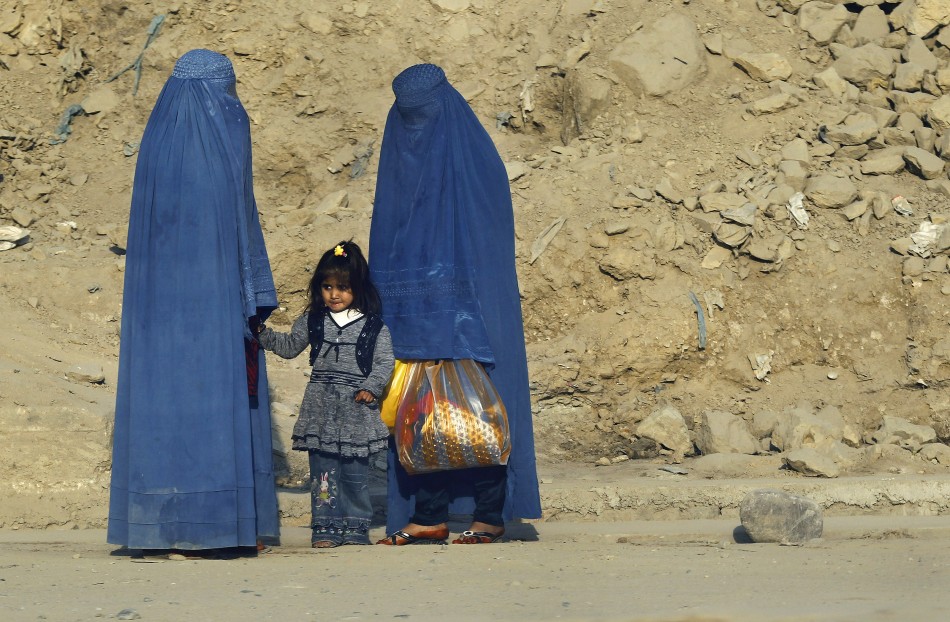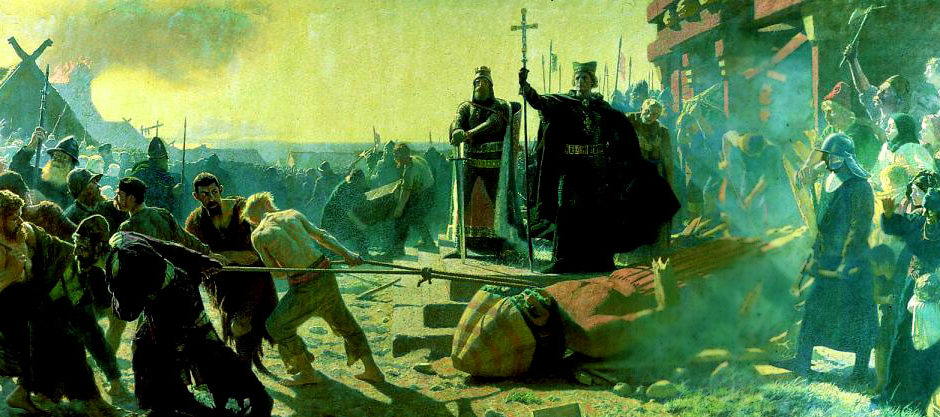I wish that our ancestors had been left in peace to develop their culture without Christian interference. This is not only because of the destruction of our religious traditions, but because of the retardation of our cultural developments too. Our ancestors were not stupid, or backward, or unenlightened. They were thinkers, warriors, artists, craftsmen, strategists, builders, and cultivators. They had a complex theology on the one hand and a systematic and complex set of legal codes on the other. As we work toward restoring (and in some cases defending) our polytheistic traditions today in the face of both monotheistic and secular hostility, it’s very, very important to take pride in what our ancestors, our polytheistic ancestors accomplished.
It is far too easy to internalize the message from those who wish to see our traditions erased, that the polytheistic world was somehow deficient, when nothing could be farther from the truth.
We need to constantly and consistently challenge this myth of “progress” that we’ve been fed. The rise of monotheism wasn’t. The ancient world – the polytheistic world—was rich with differing philosophies (Platonism, Epicureanism, Stoicism, etc.) that taught men and women how to engage rightly and well with their world.
They didn’t need the Gods to teach them right from wrong. There was a highly educated class that pushed technological reform forward. Rome, for instance had steam baths, indoor plumbing, and aqueducts. Mesopotamia had advanced and complex irrigation systems. Greece had steam engines by the 1st Century C.E. (1) With the advent of Christianity, however, these things were lost.

This Cyril is now venerated by Christians as Saint Cyril of Alexandria.
There was a very specific reason, embedded in the Christian (and monotheistic) worldview, for this loss: intellectual curiosity was a sin. Our polytheistic ancestors distinguished between good and bad curiosity.
Bad curiosity was that which encouraged gossip, rumor-mongering, and poor behavior. Good curiosity was that which led to intellectual and technological achievement. (2) Christians flipped that rubric on its head. Suddenly all curiosity was bad curiosity because only “God” could possess true wisdom and knowledge about the world.
It became improper for mankind to inquire about philosophy, science, or anything that wasn’t directly related to their God and the state of their souls. Intellectual achievement came to a screeching halt. (3) The result? A dismal period of history colloquially termed the ‘Dark Ages.’ It wasn’t until the Renaissance that art and culture began to move out from under the shadow of the Church, and not until the Age of “Reason” that intellectual inquiry began to be freed from its theological chains but this too came with a heavy, heavy price.
All religion slowly came to be viewed with suspicion, especially anything that deviated from a deeply secularized Protestant norm.(4). Devotion to the Gods, any God was little by little positioned as superstitious and perhaps even primitive.
Thus the groundwork was laid for the further dismantling of any surviving indigenous traditions. Secularism continued the work of monotheism; the latter having very carefully passed its ideological torch to a secularism that would never restore the polytheistic traditions and worldview that Christianity (and later Islam) had sundered.
For those of us committed to returning the world to its polytheistic origins, to restoring our polytheistic traditions with their vast diversity of devotional practices and values, it is important to understand that those polytheists who preceded us in the spread of history did not go gently into erasure.

On the streets of Alexandria, Egypt, a mob led by Peter the Lector brutally murdered Hypatia
They fought for their Gods and their traditions. Men and women like Olvir of Egg and Eyvind Kinnrifi, who were tortured to death for their Heathen (Norse polytheist) faith by Olaf Tryggvason (whom the Christians later canonized for his butchery), the more than four thousand Saxon Pagan martyrs who died defending their tradition and their Gods from forced conversion and destruction by Charlemagne, philosophers like the Greek Hypatia, murdered by Christians for thinking and speaking openly as a Pagan fought hard to preserve their ways, fought hard for their people’s freedom.
(5) The examples are numerous, perhaps too numerous to list. Even today, Christian groups in the United States indoctrinate their young as soldiers for Christ and there are parts of the country where Pagans and Polytheists would not be particularly safe and where immigrants, especially those holding to their traditional religions are regularly harassed. (6) Think about what it was like for that generation of polytheists who fought the good fight against monotheistic attack.
What must it have been like to see your temples and sacred spaces destroyed, burned, profaned? Imagine having to slowly hide your practices: instead of joyous processions through the streets on holy days, suddenly you’re reduced to furtive offerings under cover of night.
Or maybe spaces that were once your temples are now given over to Christian or Islamic worship, despite your every protestation. (7) Imagine when the day comes that you know your holy images, sacred statues (the repositories of the Divine Presence of your Gods), your holy vestments and implements –by which you have venerated your Gods for generations—are going to be polluted and destroyed by Christians or Muslims and the only thing you can think of to do to save them is to take those precious images and carefully commit them to the waters: submerge them in a bog as you once would have living offerings to the Gods, or bury Them, to save Them.
What was it like to bury your Gods, knowing that the world your children grew up in would be less free than the one you yourself had helped to forge?
Because with the coming of monotheism it was far less free: the position of women declined dramatically. Instead of intellectual discussion and debate, violent and vicious death became the penalty for disagreement with the theological elite. The state of hygiene and health, which was quite high in the Roman empire, declined to dismal degrees during the early Christian period. Our Gods were outlawed. Veneration was outlawed. Diversity and freedom of religious commitment was outlawed.
Today, there are many who criticize the contemporary polytheistic movement in the US. We are accused of being reactionary and paranoid when we point out that monotheism is still a threat and yet …it is.

Afghanistan
Look at the radical Islamification of places like Iran and Afghanistan, countries that within living memory were cosmopolitan centers of culture and learning and now are bowed beneath the yoke radical Islam and extremism. Look at the ongoing evangelical Christian attacks on Voudou in Haiti. (8) Look at the ongoing attacks just within the last two years on our right to practice our holiest of religious rituals in the US. (9) Or look at the growing orthodox power in Russia. (10). For each example I list, there are dozens more that I don’t.
The only reason monotheists in the West don’t resort to violence more often (as we see daily in the Middle East) is because they don’t think they have to. They think they’ve won the fight. They think that polytheists no longer exist and that where they do exist it is only a matter of time until they’re brought under Christian or Muslim control.
They would be wrong.
Galina Krasskova
Notes:
- See Steam engines: http://kotaku.com/5742457/the-ancient-greek-hero-who-invented-the-steam-engine-cybernetics-and-vending-machines
- Plutarch talks about this in “On Curiosity” from his
- Christian Zacher talks about this in his book “Curiosity and Pilgrimage.” I highly recommend it, especially chapter two, which traces the different approaches toward curiosity and intellectual inquiry from Pagan Rome to Christian Europe.
- Scholars Ann Pellegrini and Janet Jakobson discuss the deeply Protestant Christian influences on American secular culture in their book “Love the Sin.”
- See http://churchandstate.org.uk/2016/02/christianity-and-its-persecutions-of-pagans/.
- See https://freedocumentaries.org/documentary/jesus-camp for very disturbing examples.
- This is still happening today. See http://www.hindupost.in/media/the-battle-for-polytheisms-soul/ for a brief discussion of the co-option of Hindu sacred spaces by monotheists. Likewise, western influenced legislation in India would limit devotional practices and “superstition” (but not, note Christian or Islamic “superstitions,” only Hindu): http://www.dnaindia.com/india/report-karnataka-cm-siddaramaiah-reiterates-commitment-over-anti-superstition-bill-2160182 and last year in the traditional sacrifices to the Goddess Gadhimai in Nepal were banned thanks to Western influence and interference: http://www.hsi.org/world/india/news/releases/2015/07/gadhimai-festival-animal-sacrifice-cancelled-indefinitely-072815.html. These assaults on polytheistic practice are appalling. It’s typical though: if monotheism can’t conquer fully by the sword, it’ll do its damndest to legislate us and our Gods out of existence.
- See http://www.huffingtonpost.com/lisa-derrick/evangelicals-throw-rocks_b_476149.html and https://www.reddit.com/r/atheism/comments/46x7gp/flashback_evangelicals_tried_to_steal_kids_from/ for two examples among many.
- See https://krasskova.wordpress.com/2016/03/09/the-politics-of-sacrifice/ and https://krasskova.wordpress.com/2016/03/24/to-the-arm-supporters-and-arm/ for examples.
- See for example: http://wildhunt.org/2014/12/russian-orthodox-priest-seeks-to-outlaw-neo-pagans.html. Likewise we could look at the growing Christian dominionist presence in American politics and the evangelical influence slowly chipping away at American separation of Church and State. Wherever a country starts to throw off the yoke of monotheism, monotheists push back, hard.
Galina Krasskova is an American polytheist and Heathen (Norse polytheist) priest. She is the author of over twenty books , holds a Masters degree in Religious Studies and blogs regularly at Gangleri’s Grove































1 Comment